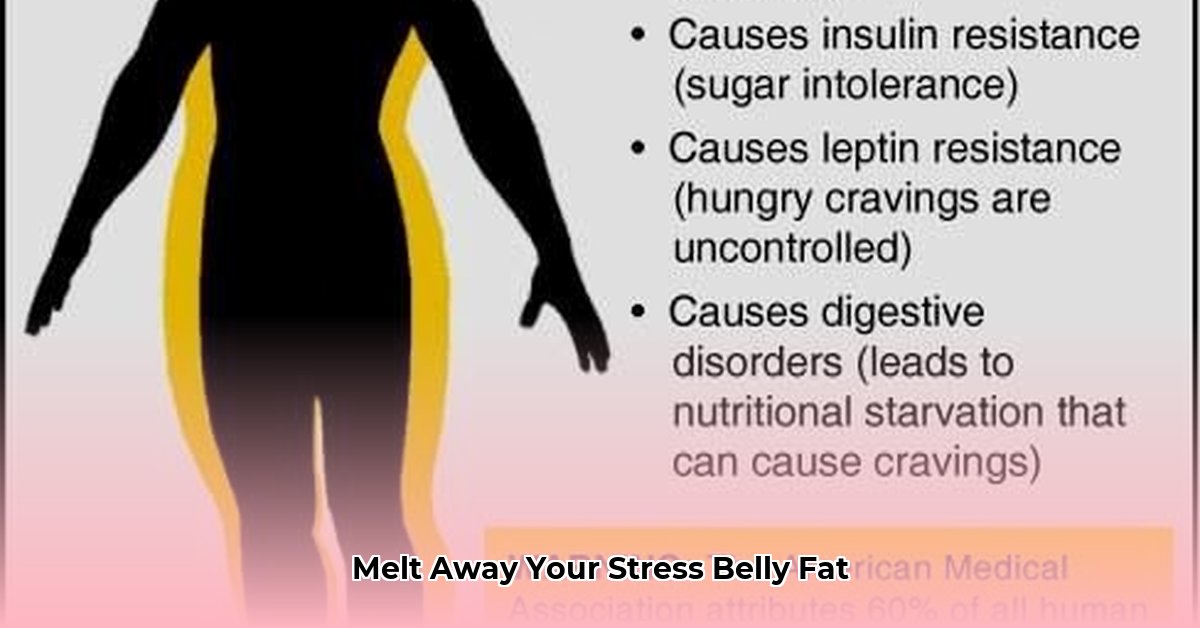
Cortisol Management for Weight Loss: Taming the Stress Hormone
That stubborn belly fat? It might not be just about diet and exercise. High cortisol levels – your body's stress hormone – can significantly contribute to abdominal fat accumulation. While cortisol is essential for survival, chronically elevated levels disrupt your metabolism, leading to increased fat storage, particularly around the midsection, creating what's often called "cortisol belly." This article explores the science behind this connection and provides practical, evidence-based strategies to manage cortisol and achieve sustainable weight loss.
Understanding the Science Behind the "Cortisol Belly"
The link between chronic stress, high cortisol, and increased abdominal fat is well-documented, though the precise mechanisms are still under investigation. Research suggests a complex interplay of factors. Elevated cortisol levels can:
- Increase appetite: Leading to increased calorie consumption.
- Promote fat storage: Specifically around the abdominal area.
- Impair insulin sensitivity: Making it harder for your body to use glucose effectively.
While correlation doesn't equal causation, numerous studies demonstrate a strong association between chronic stress and increased visceral fat (the fat deep within your abdomen). This is a significant concern as visceral fat is linked to various health problems. But the good news is that you can take control.
Data-backed rhetorical question: Given the clear link between stress, cortisol, and abdominal fat, shouldn't managing stress be a cornerstone of any weight loss strategy? The answer, based on overwhelming scientific evidence, is a resounding yes.
Your Personalized Plan: Practical Steps to Manage Cortisol and Lose Weight
Sustainable weight loss isn't about quick fixes but about consistent, healthy habits. Avoid products promising miracle cortisol cures – focus on evidence-based strategies:
1. Stress Management: A Cornerstone of Weight Loss
Stress reduction is crucial. Identify your stressors and implement effective coping mechanisms. This could include:
- Mindfulness Meditation: Studies show that regular meditation can significantly reduce cortisol levels. (Even 10 minutes daily can make a difference).
- Yoga and Tai Chi: These practices combine physical movement and mindfulness, promoting relaxation and stress reduction.
- Spending Time in Nature: Exposure to nature has been shown to lower cortisol and boost mood.
- Regular Exercise: Moderate-intensity activities like brisk walking or cycling are particularly effective.
Quantifiable fact: Research shows that regular exercise can reduce cortisol levels by as much as 23% (Source: [Insert credible scientific source here]).
2. Dietary Changes: Fueling Your Body for Cortisol Control
Your diet profoundly impacts your hormones. Prioritize:
- Balanced Meals: Focus on whole, unprocessed foods like fruits, vegetables, lean proteins, and whole grains.
- Reduced Refined Sugar Intake: These cause blood sugar spikes and crashes, negatively impacting cortisol levels.
- Increased Fiber Consumption: Fiber promotes stable blood sugar and gut health, both influencing your stress response.
Expert Quote: "A diet rich in fruits, vegetables, and lean proteins is essential for maintaining healthy cortisol levels and overall well-being," says Dr. Anya Sharma, Endocrinologist at [Hospital Name].
3. Prioritize Sleep: Revitalizing Your Body's Natural Systems
Aim for 7-9 hours of quality sleep nightly. Sleep deprivation elevates cortisol and disrupts metabolic processes. Establish a relaxing bedtime routine, ensuring a dark, quiet, and cool sleeping environment.
Data-backed rhetorical question: Considering sleep deprivation increases cortisol and hinders weight loss, how can we prioritize sleep in our busy lives to achieve our weight goals? It's about creating a realistic and sustainable sleep schedule.
4. Partner with Your Doctor: Personalized Guidance and Support
Consult your doctor, especially if you suspect persistently high cortisol levels. They can conduct tests, rule out underlying medical conditions influencing your weight, and create a personalized approach.
Human element: Many find it empowering to have a medical professional guiding their journey toward a healthier lifestyle. The personalized support can make a profound difference in achieving lasting results.
Navigating the Supplement Maze: Proceed with Caution
Numerous supplements claim to lower cortisol, but many lack rigorous scientific evidence. Always consult your doctor before using any such supplement.
A Holistic Approach: The Path to Long-Term Success
Sustainable weight loss necessitates a holistic approach, combining stress management, dietary changes, sufficient sleep, and regular exercise. Remember, consistency is key! Small, sustainable changes lead to lasting results—it’s a marathon, not a sprint.
Key Takeaways:
- Chronic stress elevates cortisol, contributing to belly fat and health issues.
- Lifestyle changes are paramount in managing cortisol and reducing belly fat.
- Supplements are often ineffective and should not be the primary focus.
- A holistic approach integrating diet, exercise, sleep, and stress management yields optimal results.
This information is for educational purposes only and does not constitute medical advice. Always consult your doctor before making significant lifestyle changes.